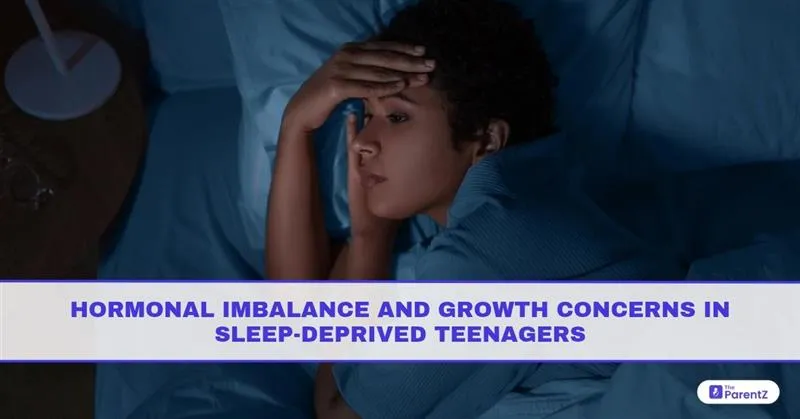Teenage years are a time of remarkable change. During adolescence, the body undergoes rapid growth, the brain develops critical functions, and the hormonal system adapts to new demands. Amidst all this, one factor quietly but profoundly influences this entire process: sleep. Yet, in today’s fast-paced world of late-night studying, social media scrolling, and packed schedules, many teenagers do not get the sleep they need. This lack of sleep is not just about feeling tired, it can cause significant hormonal imbalances and hinder healthy growth.
The Role of Sleep in Hormonal Regulation and Growth
Sleep is not a passive state. It is an active, essential process where the body restores itself and carries out vital functions. For teenagers, whose bodies are in a phase of intense growth and hormonal changes, sleep is particularly crucial.
One of the key hormones affected by sleep is growth hormone (GH), which is released in pulses during deep (slow-wave) sleep. This hormone plays a fundamental role in stimulating the growth of bones and tissues, supporting muscle development, and maintaining a healthy metabolism. Without adequate sleep, especially deep sleep, the release of growth hormone is reduced, potentially leading to slower physical development. While genetics largely determines a child’s final height, poor sleep habits during the crucial growth years can interfere with reaching that genetic potential.
Another hormone closely linked to sleep is melatonin, often called the “sleep hormone.” Melatonin helps regulate the body’s internal clock and signals when it’s time to sleep. In teenagers, natural melatonin production tends to shift later into the evening (a process known as delayed sleep phase syndrome), making it harder for them to fall asleep early. However, excessive use of screens at night, such as phones, tablets, or computers, suppresses melatonin even further, delaying sleep onset and reducing overall sleep quality.
Sleep deprivation also impacts cortisol, the body’s primary stress hormone. When teenagers do not get enough sleep, cortisol levels remain elevated, which can disrupt the balance of other hormones, increase feelings of anxiety, and even contribute to weight gain by affecting appetite regulation. High cortisol levels over time may also impair the immune system, making teenagers more prone to infections and slower recovery from illnesses.
Additionally, sex hormones like estrogen and testosterone, essential for puberty and reproductive health, can be affected by poor sleep. For girls, irregular sleep patterns have been associated with menstrual irregularities and potential fertility concerns later in life. For boys, reduced sleep can lead to lower testosterone levels, which in turn impact muscle mass development, energy levels, and mood stability.
Growth Concerns in Sleep-Deprived Teenagers
Growth is a complex process influenced by genetics, nutrition, and hormones, but sleep is often the missing piece that parents overlook. Teenagers who consistently sleep less than the recommended 8–10 hours per night may experience not only slower height gain but also other signs of growth disruption. These include delayed sexual maturation, fatigue-related muscle weakness, and reduced bone density development.
Moreover, sleep-deprived teenagers often struggle with emotional regulation, leading to increased irritability, mood swings, and feelings of being overwhelmed. These emotional challenges can, in turn, affect self-esteem, academic performance, and social relationships, creating a cycle that further disrupts healthy sleep patterns and overall development.
Supporting Healthy Sleep for Teen Growth and Well-Being
While the hormonal impacts of sleep deprivation are concerning, there is hope. Encouraging healthy sleep habits can make a real difference in supporting your teenager’s growth and hormonal health. Parents can help by fostering a consistent sleep routine, ensuring a regular bedtime and wake-up time, even on weekends. Reducing screen exposure in the evening, especially within an hour before bedtime, can promote natural melatonin production and better sleep quality. Creating a calm and quiet sleep environment, free from distractions like phones and televisions, also helps.
It’s important for parents to approach sleep conversations with empathy and understanding, rather than rigid rules. A teenager may resist early bedtimes, but explaining the science of sleep, how it helps them grow, manage emotions, and stay healthy, can make them more willing to cooperate.
Conclusion
Sleep is more than just a break from the day’s activities. For teenagers, it is a critical window for hormonal regulation, growth, and development. When sleep is compromised, the effects ripple through the body—impacting growth hormone release, disrupting cortisol levels, and interfering with sex hormone balance. These disruptions can lead to delayed physical development, emotional challenges, and long-term health concerns.
By understanding the importance of sleep and working together as a family to create healthy routines, parents can help teenagers protect their hormonal health, support their growth, and set the foundation for a strong, resilient future. In a world that often glorifies busyness and late nights, let’s remind our teens that sometimes, the best thing they can do for themselves is simply to rest.





Be the first one to comment on this story.